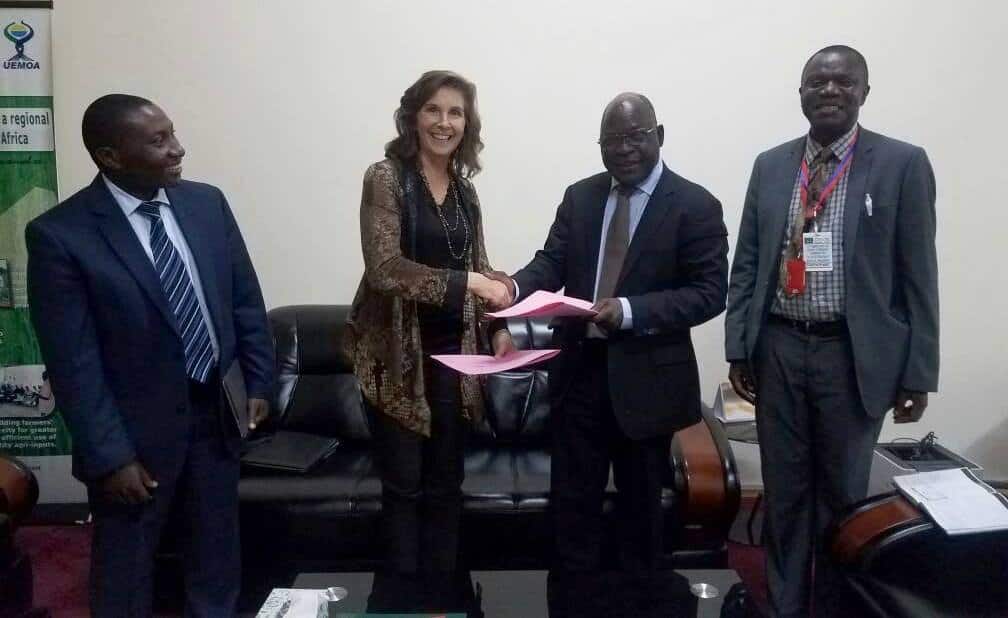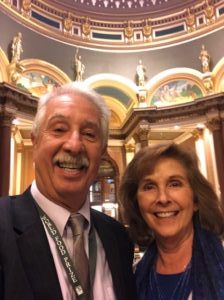Barbara Stinson Reflects on Meridian
12 November 2019I am proud to share that Barbara Stinson, one of Meridian’s co-founders and a Senior Partner for over 20 years, has been named as the new President of the World Food Prize Foundation. Barbara’s immeasurable contributions to Meridian and our partners, alongside more than two decades of experience in food, agriculture, and development issues, will serve her well as she advances the Foundation’s crucial mission. Barbara: on behalf of your Meridian family, congratulations on this momentous and exciting next step! We look forward to staying in touch, and we hope to partner with you in your new role.
—Tim Mealey, Managing Director and Senior Partner at Meridian Institute
I sat down with Barbara on the eve of her transition, and asked her to reflect on her time at Meridian and share what she looks forward to as she assumes her new role with the Foundation.
What are you most proud of in your tenure at Meridian?
I have worked with wonderful people in diverse fields during my 22 years at Meridian; there are so many projects I could name! But the first that comes to mind is PACA (the Partnership for Aflatoxin Control in Africa), which convened stakeholders from across Africa to better manage the scourge of aflatoxins (deadly compounds that often contaminate staple crops). Meridian helped establish the PACA program, housed at the African Union Commission, which has raised awareness about the dangers of aflatoxins, provided programmatic and technical support to reduce human health impacts, and assisted many affected countries to create aflatoxin management plans. The program now serves as a model that may be expanded into a continent-wide food safety agency. I am so proud of how Meridian supported our partners to develop and launch an African-led, African-owned initiative that reduces health risks in foods that millions depend on to survive.
In a completely different geography, I led a Meridian team that spent close to ten years working in the Florida Everglades. We supported collaborative planning among scientists, engineers, water managers, fishermen, and government officials in order to meet the water demands of South Florida and recover the Everglades ecosystem. A lot of what we accomplished has set in motion work that continues today.
All that said, what I’m most proud of at Meridian is the organizational culture we have built. Our people are outstanding; their professionalism and integrity brings partners back to work with us again and again. We are forward-thinking. We are highly effective. And we foster and retain great talent because of our culture.

You have had a long and rich career in the field of collaborative problem-solving and conflict mediation. How has the field changed since you started out?
It’s almost astounding how much it’s evolved! There used to be a small number of practitioners. Now, the field has expanded in every dimension: you find conflict resolution specialists, facilitators, and mediators all over the world and in every field, not just around environmental issues. Many technical consulting firms now have facilitation practices. Strategic planning organizations include meeting facilitation and management services. Major nonprofit environmental organizations conduct collaborative planning and stakeholder engagement as flagship projects. Government officials are being trained in facilitation and process design. People across all sectors now understand the importance of bringing people together to solve problems much better than they did a few decades ago. I think that some of this has come about because of participation in Meridian projects—it’s one impact of our work that we sometimes forget about.
I’m taking with me lessons on the importance of keeping your eyes on the horizon, staying attentive to new issues, and being willing to constantly evolve and grow—all of which takes courage.
Your work at Meridian has taken you all over the U.S. and the world, so we have to ask: where is one of the more interesting or unique place you’ve ever held a meeting?
One of my favorite meetings was convened in Paris, just not the one you are thinking of—I’m thinking of Parys, South Africa! It’s a small, wonderful community outside of Johannesburg, in the savannah near a safari park on the Vaal River. Meridian brought together representatives from the European Union, the African Union, and major international donors to advance the Comprehensive African Agriculture Development Program. It was easy to inspire creative and productive work in such an idyllic setting!
Tell us about the World Food Prize Foundation. What drew you to the organization?
The World Food Prize Foundation is a renowned organization founded by Norman Borlaug, the only Nobel Prize winner for agriculture, over 30 years ago. Its primary mission is to recognize and reward research scientists and field practitioners who are feeding the world. It awards an annual prize to someone who is substantially contributing to increasing the quantity, availability, and quality of food worldwide. The Foundation also convenes one of the most prestigious international dialogues on food and agriculture. I am honored to build on this body of work and shape the next era of both of these components.
A third component is less well-known: training and advancing young people to work in food and agriculture. Every year, the Foundation’s Global Youth Institute convenes hundreds of high school students interested in critical issues in food and agriculture; the Institute also recognizes standout teachers and places students in relevant internships all over the world. It’s incredible to be part of seeding the next generation of food and agriculture leaders!
As you say goodbye to Meridian, what reflections from your two decades here are you carrying forward with you?

These past 22 years with my colleagues at Meridian have been tremendously gratifying, both personally and professionally. As I depart, I’m taking with me lessons on the importance of keeping your eyes on the horizon, staying attentive to new issues, and being willing to constantly evolve and grow—all of which takes courage.
I’ve been thinking a lot about courage recently. In addition to stretching my own horizons professionally—taking my skills to a new organization and platform—I have been stretching myself physically by working out and taking weightlifting classes! It’s been really challenging—grueling, even. When you push your body and muscles to the limit, you actually start shaking. One of my weightlifting coaches tells me that “shaking is where the change happens.” I think that’s true physically, personally, and professionally. That shaking, taking on challenges, is the courageous territory where you can really make a difference.
Meridian has been shaking things up for decades: creating impact on tough, cutting-edge issues, and encouraging partners to confront thorny problems. I’m proud and grateful to have worked with such wonderful partners and colleagues over these many years. As I close this chapter, I am looking forward to taking on new challenges—including moving to Iowa after 30 years in Colorado—and making a difference on the food and agriculture issues I am passionate about at the World Food Prize Foundation.